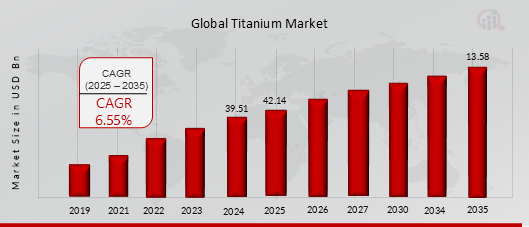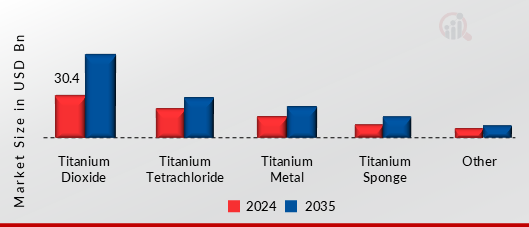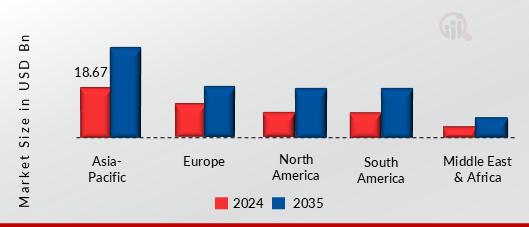Titanium Market Overview
The Titanium Market was valued at USD 39.51 billion in 2024. The Titanium Market industry is projected to grow from USD 42.14 billion in 2025 to USD 81.97 billion by 2035, exhibiting a compound annual growth rate (CAGR) of 6.55% during the forecast period (2025-2035).
The growing demand in the aerospace industry and increasing use of titanium in medical applications are driving the growth of the Titanium Market.
As per the Analyst at MRFR, the growing demand for titanium in the aerospace industry is a significant driver of the Titanium Market. This demand stems from the metal's exceptional combination of strength, lightness, and resistance to high temperatures and corrosion, making it ideal for use in aircraft and spacecraft. Let’s break it down into key factors that contribute to this growing demand:
Titanium is a preferred material in the aerospace industry due to its superior strength-to-weight ratio. Aircraft require materials that are strong enough to withstand the stresses of flight while being as light as possible to ensure fuel efficiency and optimal performance. Titanium’s ability to combine these two characteristics makes it highly valuable for both commercial and military aircraft. It also withstands high temperatures, crucial for parts such as engine components that are exposed to extreme heat during flight.
FIGURE 1: TITANIUM MARKET VALUE (2019-2035) USD BILLION

Source: Secondary Research, Primary Research, MRFR Database, and Analyst Review
Titanium Market Opportunity
RISING DEMAND FOR TITANIUM DIOXIDE
The rising demand for titanium dioxide (TiO₂) presents a significant opportunity for the Titanium Market. Titanium dioxide is a key compound derived from titanium that is used primarily as a white pigment in various industries, including paints, coatings, plastics, and cosmetics. Its exceptional properties, such as high refractive index, opacity, and non-toxic nature, make it an essential ingredient in these applications. The growth in demand for titanium dioxide is expected to drive further growth in the overall titanium market, as it creates a larger market for titanium ore and other titanium-based products.
The largest market for titanium dioxide is in the paints and coatings industry, where it is used as a white pigment due to its ability to provide opacity, brightness, and durability. Titanium dioxide is valued for its UV resistance, making it an ideal ingredient in exterior paints and coatings that need to withstand harsh environmental conditions. As global construction activities continue to grow, especially in emerging economies like China, India, and Brazil, the demand for paints and coatings is increasing, thereby driving the need for titanium dioxide.
Additionally, the rising trend in renovation and home improvement also fuels the demand for high-quality paints, which often rely on titanium dioxide for their performance.
For example, companies like PPG Industries and Sherwin-Williams rely heavily on titanium dioxide to manufacture paints and coatings for a variety of applications, including automotive, residential, and commercial buildings. As these industries expand, the need for titanium dioxide will continue to grow, benefiting the overall titanium market.
Titanium dioxide is also increasingly used in the plastics industry to enhance the aesthetic appeal and UV stability of plastic products. By incorporating titanium dioxide into plastics, manufacturers can improve the whiteness, brightness, and opacity of products such as films, bottles, and packaging materials. Additionally, the use of TiO₂ helps protect plastic from UV degradation, increasing the longevity and durability of the material. The plastic packaging industry, in particular, has seen significant growth, driven by the global demand for consumer goods, packaged food, and beverages.
Companies like BASF and DuPont supply titanium dioxide to plastic manufacturers, which use it to produce higher-quality plastic products. As global demand for plastic products increases, driven by sectors like consumer goods, automotive, and electronics, the demand for titanium dioxide in plastics will likely rise, presenting an opportunity for the broader titanium market.
Titanium dioxide is widely used in the cosmetics and personal care industries. It is a key ingredient in products like sunscreens, foundations, toothpaste, and powders. In sunscreens, titanium dioxide provides UV protection, helping to shield the skin from harmful ultraviolet rays. It is also used as a pigment in cosmetics due to its ability to provide a smooth, opaque finish. The growing global awareness about sun protection and the increasing demand for cosmetic products with high-performance features are boosting the demand for titanium dioxide in the cosmetics sector.
As more consumers prioritize skincare and personal care, especially in developed markets like the United States and Europe, the demand for titanium dioxide in sunscreens and other products is expected to rise.
Titanium Market Segment Insights
Titanium by Product Type Insights
Based on Product Type, this segment includes Titanium Dioxide, Titanium Tetrachloride, Titanium Metal, Titanium Sponge (Bar, Wire, Sheet, Others), Others. The Titanium Dioxide segment dominated the global market in 2024, while it is projected to be the fastest–growing segment during the forecast period. Titanium dioxide (TiO₂) is a white, opaque, naturally occurring mineral that exists in several crystalline forms, with the most important being rutile and anatase.
These naturally occurring oxide forms can be mined and processed to serve as a primary source of commercial titanium. Titanium dioxide is odorless and highly absorbent, making it an ideal material for various applications. Its most prominent function in powder form is as a widely used pigment, prized for its ability to provide exceptional whiteness and opacity. This property has made titanium dioxide a key ingredient in products such as paints, coatings, and plastics.
FIGURE 2: TITANIUM MARKET SHARE BY PRODUCT TYPE 2024 AND 2035 (USD BILLION)

Source: Secondary Research, Primary Research, MRFR Database and Analyst Review
Titanium by Grade Insights
Based on Grade, this segment includes Commercially Pure Titanium, Titanium Based Alloys, Titanium Alpha Alloys, Others. The Titanium Based Alloys segment dominated the global market in 2024, while the Others segment is projected to be the fastest–growing segment during the forecast period. Titanium-based alloys are made by combining titanium with other elements such as aluminum, vanadium, molybdenum, and iron to enhance specific properties like strength, heat resistance, and formability.
These alloys are more versatile than commercially pure titanium, offering a balance of high strength, improved wear resistance, and better thermal stability, which makes them suitable for demanding applications, particularly in the aerospace, automotive, and industrial sectors. Alpha alloys, which are primarily composed of titanium and aluminum, are known for their high strength at elevated temperatures, while beta alloys (which contain elements like vanadium or molybdenum) offer excellent weldability and low density. Alpha-beta alloys, combining both types, are commonly used in the aerospace industry for components such as turbine blades, airframes, and landing gear.
Titanium by End Use Industry Insights
Based on the End Use Industry, this segment includes Automotive, Aerospace & Defense, Chemical, Medical, Power Generation, Others. The Aerospace & Defense segment dominated the global market in 2024, while it is projected to be the fastest–growing segment during the forecast period. Titanium is one of the most crucial materials for the aerospace and defense industries due to its exceptional strength, low density, and resistance to corrosion at high temperatures.
It is used extensively in aircraft structures, including airframes, wings, and turbine engines, where its lightweight and strength-to-weight ratio are essential for optimal performance and fuel efficiency. Titanium alloys are also used in military applications, such as fighter jets, missiles, and spacecraft, where durability and resistance to extreme conditions are critical. The continued advancements in aerospace technology, particularly in the development of commercial airliners and space exploration systems, are expected to drive a sustained demand for titanium. The aerospace and defense sectors remain the largest consumers of titanium, particularly for high-performance applications.
Titanium Regional Insights
Based on the Region, the global Titanium is segmented into North America, Europe, Asia-Pacific, South America and Middle East & Africa. The Asia Pacific dominated the global market in 2024, while it is projected to be the fastest–growing segment during the forecast period. Major demand factors driving the Asia Pacific market are the growing demand in the aerospace industry and increasing use of titanium in medical applications.
The Asia Pacific region is expected to witness the highest growth in the Titanium Market over the coming years, largely driven by the rapid industrialization and expanding aerospace and automotive sectors in countries such as China, Japan, and India. China is one of the largest consumers of titanium globally, especially in aerospace, defense, and chemical industries.
The country is also focusing on developing its domestic titanium production capabilities, which is expected to reduce its reliance on imports. Japan is another significant player, particularly in the aerospace sector, where it has a strong presence with companies like Mitsubishi Heavy Industries and Kawasaki Heavy Industries.
FIGURE 3: TITANIUM MARKET VALUE BY REGION 2024 AND 2035 (USD BILLION)

Source: Secondary Research, Primary Research, MRFR Database, and Analyst Review
Further, the countries considered in the scope of the Application Tracking System Market are the US, Canada, Europe, UK, France, Russia, Italy, Spain, China, India, Japan, South Korea, Malaysia, Thailand, Indonesia, Brazil, Mexico, Argentina, GCC Countries, South Africa and others.
Global Titanium Key Market Players & Competitive Insights
Many global, regional, and local vendors characterize the Titanium Market. The market is highly competitive, with all the players competing to gain market share. Intense competition, rapid advances in technology, frequent changes in government policies, and environmental regulations are key factors that confront market growth. The vendors compete based on cost, product quality, reliability, and government regulations. Vendors must provide cost-efficient, high-quality products to survive and succeed in an intensely competitive market.
The major competitors in the market are TIMET, Allegheny Technologies Incorporated (ATI), Tronox, Osaka Titanium Technologies Co., Ltd., Carpenter Technology, U.S. Titanium Industry Inc., Haynes International, Nippon Steel Corporation, American Elements, Ust-Kamenogorsk Titanium and Magnesium Plant JSC are among others. The Titanium Market is a consolidated market due to increasing competition, acquisitions, mergers and other strategic market developments and decisions to improve operational effectiveness.
Key Companies in the Titanium Market include
- TIMET
- Allegheny Technologies Incorporated (ATI)
- Tronox
- Osaka Titanium Technologies Co., Ltd.
- Carpenter Technology
- S. Titanium Industry Inc.
- Haynes International
- Nippon Steel Corporation
- American Elements
- Ust-Kamenogorsk Titanium and Magnesium Plant JSC
Titanium Market Industry Developments
January 2024: Nippon Steel Corporation decided to indirectly acquire a 20% interest in Elk Valley Resources, the steelmaking coal business partnership sold by Teck Resources Limited, subject to fulfillment of conditions precedent such as authority approvals in relevant countries. In addition, Nippon Steel has entered into an offtake rights agreement with EVR JV for the purpose of long-term and stable procurement of steelmaking coal.
10-July-2024: XLRI Jamshedpur and ArcelorMittal Nippon Steel India have signed a Memorandum of Understanding (MoU) to promote innovation, develop talent, and enhance leadership skills in the manufacturing sector. According to officials, the partnership aims to foster innovation, develop talent, and drive leadership excellence within the manufacturing sector.
6-November-2024: IREL (India) Ltd, formerly Indian Rare Earths Limited & Ust-Kamenogorsk Titanium and Magnesium Plant JSC, (UKTMP) of Kazakhstan has entered into an agreement to set up a joint venture in India for production of Titanium slag. The joint venture, IREUK Titanium Limited, will undertake beneficiation of low-grade ilmenite to high grade titanium feedstock with the aim of creating a titanium value chain in the country. The joint venture, to be set up in Odisha, will also create employment opportunities in the state.
10-April-2019: Tronox a global mining and inorganic chemicals company announced it has completed its acquisition of the titanium dioxide (“TiO2“) business of The National Titanium Dioxide Company Limited (“Cristal”). The FTC issued an Order and Decision allowing the transaction to proceed with the divestiture of Cristal’s North American TiO2 business.
Titanium Market Segmentation
Titanium by Product Type Outlook
- Titanium Dioxide
- Titanium Tetrachloride
- Titanium Metal
-
Titanium Sponge
- Others
Titanium by Grade Outlook
- Commercially Pure Titanium
- Titanium Based Alloys
- Titanium Alpha Alloys
- Others
Titanium by End Use Industry Outlook
- Automotive
- Aerospace & Defense
- Chemical
- Medical
- Power Generation
- Others
Titanium Regional Outlook
-
North America
-
Europe
- Germany
- UK
- France
- Russia
- Italy
- Spain
- Rest of Europe
-
Asia-Pacific
- China
- India
- Japan
- South Korea
- Malaysia
- Thailand
- Indonesia
- Rest of Asia-Pacific
-
South America
- Brazil
- Mexico
- Argentina
- Rest of South America
-
Middle East & Africa
- GCC Countries
- South Africa
- Rest of Middle East & Africa
| Report Attribute/Metric |
Details |
| Market Size 2024 |
USD 39.51 Billion |
| Market Size 2025 |
USD 42.14 Billion |
| Market Size 2035 |
USD 81.97 Billion |
| Compound Annual Growth Rate (CAGR) |
6.55% (2025-2035) |
| Base Year |
2024 |
| Forecast Period |
2025-2035 |
| Historical Data |
2019-2023 |
| Forecast Units |
Value, Volume (USD Billion, Kilo Tons) |
| Report Coverage |
Revenue Forecast, Competitive Landscape, Growth Factors, and Trends |
| Segments Covered |
By Product Type, By Grade, By End Use Industry |
| Geographies Covered |
North America, Europe, Asia Pacific, South America, Middle East & Africa |
| Countries Covered |
The US, Canada, Europe, UK, France, Russia, Italy, Spain, China, India, Japan, South Korea, Malaysia, Thailand, Indonesia, Brazil, Mexico, Argentina, GCC Countries, South Africa |
| Key Companies Profiled |
TIMET, Allegheny Technologies Incorporated (ATI), Tronox, Osaka Titanium Technologies Co., Ltd., Carpenter Technology, U.S. Titanium Industry Inc., Haynes International, Nippon Steel Corporation, American Elements, Ust-Kamenogorsk Titanium and Magnesium Plant JSC |
| Key Market Opportunities |
· Rising demand for titanium dioxide |
| Key Market Dynamics |
· Growing demand in aerospace industry · Increasing use of titanium in medical applications |
Frequently Asked Questions (FAQ):
USD 39.51 Billion is the Titanium Market in 2024
The Titanium Based Alloys segment by Grade holds the largest market share and grows at a CAGR of 6.61% during the forecast period.
Asia-Pacific holds the largest market share in the Titanium Market.
TIMET, Allegheny Technologies Incorporated (ATI), Tronox, Osaka Titanium Technologies Co., Ltd., Carpenter Technology, U.S. Titanium Industry Inc., Haynes International, Nippon Steel Corporation, American Elements, Ust-Kamenogorsk Titanium and Magnesium Plant JSC are prominent players in the Titanium Market.
The Titanium Dioxide segment dominated the market in 2024.

















